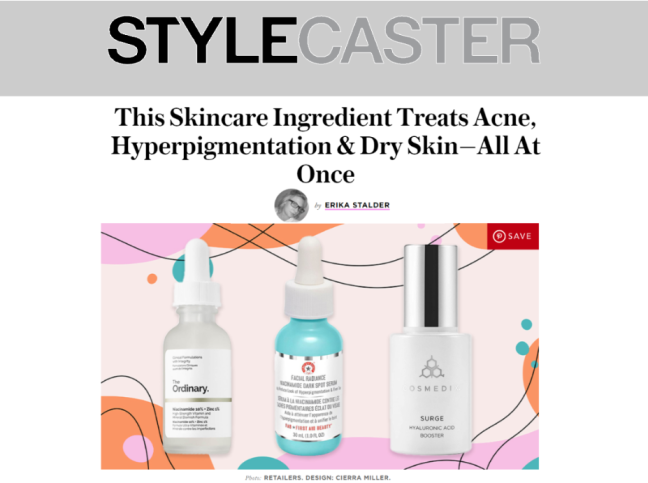Dr. Jegasothy and Style Caster Talk About a New King In Skincare

Move over retinol, there’s a new king in town and it’s called niacinamide. In this StyleCaster® article “This Skincare Ingredient Treats Acne, Hyperpigmentation & Dry Skin—All At Once” written by Erika Stalder, Dr. Jegasothy explains how niacinamide, a form of Vitamin B3, can perform multiple functions that are all beneficial to the skin. She notes that niacinamide can strengthen and hydrate the skin and fade dark spots caused by hyperpigmentation. Best of all, it can help reduce acne and inflammation on the skin. While all these benefits are great, she also clarifies that not all niacinamide formulas are the same and that reading product labels is one of the most important steps in choosing the right product.
Here are some takeaways of Dr. Jegasothy’s advice in the article:
On Protecting the Skin and Fading Dark Spots
Using niacinamides also helps build a keratin barrier, which not only means that a “fortified barrier may prevent excess UV radiation and reduce hyperpigmentation”, but it also means that it can help those who suffer from skin-compromised diseases (such as psoriasis, eczema, or chronic skin disease), says Dr. Jegasothy in the article. “Niacinamide promotes keratin production, and as such, can play a vital role in any skincare routine by building up the skin’s natural defense barrier, making it more resistant to external irritants such as chemicals in the air and wind chapping.”
Despite all its benefits, there are possibilities of exacerbating dark spots if you don’t suffer from a preexisting condition such as atopic dermatitis or sensitized skin. In this case, you would be better suited for treatments such as kojic acid, hydroquinone and arbutin.
In any case, we should pay attention to the concentration of these treatments, says Dr. Jegasothy to Erika Stalder, “There were a few reports in the medical literature showing patients who used very high-strength niacinamide (we’re talking 10 or 20 percent), would experience irritation and would end up with more hyperpigmentation, particularly in darker-skinned patients.”
On Minimizing Acne and Inflammation
The best part of niacinamide is its effect on combating acne and inflammation. Dr. Jegasothy says that “probably, the most proven and effective use of niacinamide is in addressing acne.” A person with acne usually has blocked pores by an excess of sebum produced by the skin, which is where niacinamide’s sebum reducing properties help, says Dr. Jegasothy, “so anything that would reduce sebum in the pore is going to help sort out all facets of the acne papule formation.” As mentioned in the StyleCaster® article, Dr. Jegasothy says that concentration is a key factor in using niacinamide: “up to a certain percentage, niacinamide helps to control sebum production, which in turn minimizes acne formation and inflammation.”
On Reading Labels
Like she told Erika Stalder, Dr. Jegasothy cannot stress enough to make sure you are choosing the right products by reading the product labels. While products may contain niacinamide, they may also be paired with acids that in turn would lead to problems such as rosacea, flushing and redness in the skin. “I’m afraid that’s why some people are saying bad things about niacinamide’s effects because they’re using formulas that pair it with acids.” When niacinamide is mixed into an acidic, or low pH environment, it can convert to nicotinic acid, which can be very inflammatory in any skin type.

In the end, niacinamide’s king status in the skincare realm is not one to be trifled with, especially when it comes to acne and inflammation, according to Dr. Jegasothy. Its uses are far and wide when used with the right ingredient combinations and with the right amounts. While you might want to go out right now and get your first niacinamide product, your first step in proceeding with a skincare regiment is to consult a board-certified dermatologist to make sure you eliminate the chance of creating or exacerbating any skin problems.




